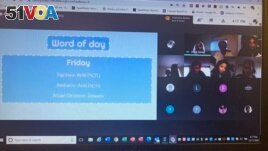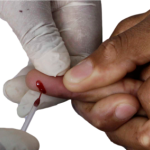23 January 2021
One of the most important parts of a college application is a student's list of "extracurricular activities."
A student might be a member of a sports team, spend time tutoring younger children or taking part in a school's theater program or singing group. Some students might do all of those things.
Usually at this time, American high school students are finishing their college applications. They are also visiting universities and taking admissions tests like the SAT.
But this is not "most years."
Since most people are not traveling, students are taking video campus tours. Universities that used to talk to possible students in person are doing so by video call, instead. Along with written applications, universities are asking students to send video introductions. Some schools asked students to write about how the pandemic changed their lives.
Kidist Bekele's story
One student whose life is different over the last 10 months is 18-year-old Kidist Bekele. She grew up in Ethiopia but now lives in Annandale, Virginia, near Washington, D.C.
On her application, she wrote about what it was like coming to America in 9th grade. Bekele said she wants to be an engineer and is hoping to go to a university that offers good science classes. She said attending school over video most of the last year has been hard, especially in science and math classes that require a lot of help from teachers.
She also missed the support of adults at her school who could help with college applications. Completing her application at home was not easy.
"I'm first generation so my parents did not go to school in here [the U.S.] so they don't know how to fill out a lot of things, like the FAFSA...That have been very hard. But and also, family-wise, my mom lost her job and my dad is the only one who works in our family. So financially, it was also kind of hard, but I'm getting through it."

Kidist Bekele grew up in Ethiopia and moved to Virginia as a teenager.
The FAFSA is a financial aid application used by the federal government to find out if students may receive loans, grants or other aid that can help pay for college.
Student advisor Laura Wells
Laura Wells is one of the Annandale High School advisors who works with students like Bekele on their college applications. In most years, the process begins one year before students complete high school. They start writing their essays in 11th grade. Then the next year, they only have to prepare the application.
Wells and her students are hurrying to finish some parts of their applications this year. In October, Wells said, she put her own children to bed and then spent the rest of the night making video calls with her students so she could help with their applications.
She said it is much easier to do work on an application in person than on a video call. Many students Wells works with have parents who are not U.S. citizens. They are immigrants and have a Permanent Resident Card, sometimes known as a "Green Card." As a result, the teenagers need to provide additional documents to include with their application.
Sometimes they have to take an extra test to prove they can speak English well enough.
"The questions are so confusing," Wells said.
The pandemic made it hard to complete the applications and Wells said it limited opportunities for younger students who wanted to try new activities.
"They were really looking forward to being able to apply to a lot of new clubs and honor societies this year. And a lot of those are not operating...So the juniors are frustrated because they were really excited to get more involved and build those resumes and they just haven't really had the opportunity to do that."
Students are still trying to improve their standing even without traditional "resume builders." Wells said one group worked on a project for Amnesty International. Another organized an effort to send reading materials to students in Africa.
Bekele said she and her friends from East Africa organized an Ethiopian and Eritrean Association and held meetings online.
Wells said even if students are not able to join clubs or get involved in group activities, there are still ways to show American colleges their abilities.
Students can take a free online class from a U.S. university in a subject that they could not take at their own school. They can do these classes in their free time. Extra activities can make a difference to the people who consider applications.
"Colleges want to see that you're passionate about learning. They want to see that you take initiative of your learning, right? To develop whatever skills it is you can develop in the space that you have...If you can articulate that and still show that passion for learning, that awareness of yourself and the world around you, I think that's what's really important to colleges. And the particular form that that happens to take doesn't really matter."
The pandemic also made colleges and universities worried about how many students to accept. Some students are putting off college until a vaccine is available. As a result, many small colleges are worried they may not have enough students. Those colleges are making it easier for students to apply and to be accepted.
Other universities that are difficult to get into, like Harvard, are worried that they may have too many students. Last year, some students who were accepted decided to wait a year. This year, Harvard offered acceptance to only about seven percent of early applicants. Last year, the school accepted about 14 percent of its early applicants.
Bekele offered this advice to students who will be filling out their applications next year.
"When you look at going to college and doing this big things, it's not only about your grades, try to participate in other activities outside of your school. It's not only about your grade. So that's what I lost. I didn't do. I couldn't get those kind of information."
I'm Dan Friedell.
Dan Friedell wrote this story for Learning English with contributions from The Associated Press. Mario Ritter, Jr. was the editor.
Words in This Story
extracurricular –adj. used to describe extra activities (such as sports) that can be done by the students in a school but that are not part of the regular schedule of classes
tutor –v. to teach a single student
grant –n. an amount of money that is given to someone by a government, a company, etc., to be used for a particular purpose (such as scientific research)
confusing- adj. difficult to understand
resume- n. a short document describing your education, work history, etc., that you give an employer when you are applying for a job
passionate- adj. having, showing, or expressing strong emotions or beliefs
initiative- n. the energy and desire that is needed to do something
particular- n. a specific detail or piece of information
articulate –v. to express ideas clearly and effectively
participate- v. to be involved with others in doing something : to take part in an activity or event with others
What do you think of Kidist Bekele's story? We want to hear from you. Write to us in the Comments Section.










